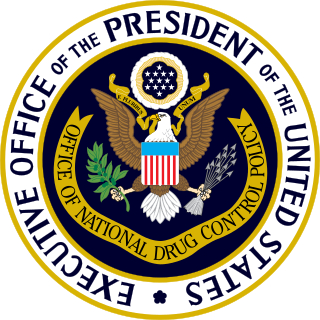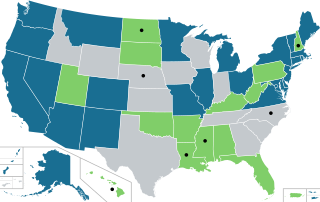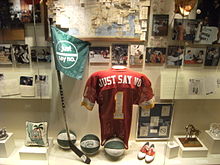
The Office of National Drug Control Policy (ONDCP) is a component of the Executive Office of the President of the United States.
Drug czar is an informal name for the person who directs drug-control policies in various areas. The term follows the informal use of the term czar in U.S. politics. The 'drug czar' title first appeared in a 1982 news story by United Press International that reported that, "[United States] Senators ... voted 62–34 to establish a 'drug czar' who would have overall responsibility for U.S. drug policy." Since then, several ad hoc executive positions established in both the United States and United Kingdom have subsequently been referred to in this manner.

John P. Walters is the president and chief executive officer of Hudson Institute; he was appointed in January 2021. He joined Hudson in 2009 as the executive vice president and most recently was the chief operating officer. Previously, Walters was Director of the White House Office of National Drug Control Policy (ONDCP) in the George W. Bush administration. He held that position from February 5, 2001 to January 20, 2009. As the U.S. "Drug Czar", Walters coordinated all aspects of federal anti-drug policies and spending. As drug czar, he was a staunch opponent of drug decriminalization, legalization, and medical marijuana.

The war on drugs is the policy of a global campaign, led by the United States federal government, of drug prohibition, military aid, and military intervention, with the aim of reducing the illegal drug trade in the United States. The initiative includes a set of drug policies that are intended to discourage the production, distribution, and consumption of psychoactive drugs that the participating governments, through United Nations treaties, have made illegal.
Commonly-cited arguments for and against the prohibition of drugs include the following:

In the United States, the non-medical use of cannabis is legalized in 24 states and decriminalized in 7 states, as of November 2023. Decriminalization refers to a policy of reduced penalties for cannabis offenses, typically involving a civil penalty for possessing small amounts, instead of criminal prosecution or the threat of arrest. In jurisdictions without penalty the policy is referred to as legalization, although the term decriminalization is sometimes used for this purpose as well.

In the United States, increased restrictions and labeling of cannabis as a poison began in many states from 1906 onward, and outright prohibitions began in the 1920s. By the mid-1930s cannabis was regulated as a drug in every state, including 35 states that adopted the Uniform State Narcotic Drug Act. The first national regulation was the Marihuana Tax Act of 1937.

The drug policy in the United States is the activity of the federal government relating to the regulation of drugs. Starting in the early 1900s, the United States government began enforcing drug policies. These policies criminalized drugs such as opium, morphine, heroin, and cocaine outside of medical use. The drug policies put into place are enforced by the Food and Drug Administration and the Drug Enforcement Administration. Classification of Drugs are defined and enforced using the Controlled Substance Act, which lists different drugs into their respective substances based on its potential of abuse and potential for medical use. Four different categories of drugs are Alcohol, Cannabis, Opioids, and Stimulants.
A drug policy is the policy regarding the control and regulation of psychoactive substances, particularly those that are addictive or cause physical and mental dependence. While drug policies are generally implemented by governments, entities at all levels may have specific policies related to drugs.
The War on Drugs is a term for the actions taken and legislation enacted by the US federal government, intended to reduce or eliminate the production, distribution, and use of illicit drugs. The War on Drugs began during the Nixon administration with the goal of reducing the supply of and demand for illegal drugs, but an ulterior racial motivation has been proposed. The War on Drugs has led to controversial legislation and policies, including mandatory minimum penalties and stop-and-frisk searches, which have been suggested to be carried out disproportionately against minorities. The effects of the War on Drugs are contentious, with some suggesting that it has created racial disparities in arrests, prosecutions, imprisonment, and rehabilitation. Others have criticized the methodology and the conclusions of such studies. In addition to disparities in enforcement, some claim that the collateral effects of the War on Drugs have established forms of structural violence, especially for minority communities.
This is a history of drug prohibition in the United States.

The Anti-Drug Abuse Act of 1988 is a major law of the War on Drugs passed by the U.S. Congress which did several significant things:
- Created the policy goal of a drug-free America;
- Established the Office of National Drug Control Policy; and
- Restored the use of the death penalty by the federal government.

Aviation Drug-Trafficking Control Act of 1984 is a United States Federal law amending the Federal Aviation Act of 1958. The statutory law authorized criminal penalties for the unlawful aerial transportation of controlled substances. The Act of Congress mandated the revocation of aircraft registrations and airman certificates by the Federal Aviation Administration whereas an aircraft aviator knowingly engages in the transit of illicitly used drugs. The Act established authority and a statute of limitations for the reissuance of airman certificates by the United States Secretary of Transportation.

Terms related to cannabis include:
During the administration of American President Jimmy Carter (1977–1981), the United States gave further consideration to the decriminalization of cannabis (marijuana), with the support of the president. However, law enforcement, conservative politicians, and grassroots parents' groups opposed this measure. The net result of the Carter administration was the continuation of the War on Drugs and restrictions on cannabis, while at the same time cannabis consumption in the United States reached historically high levels.
During the administration of American President Gerald Ford (1974–1977), the president moderated the strict anti-cannabis stance of his predecessor, resigned president Richard Nixon, though this did not result in any significant weakening of federal cannabis policy. In contrast with Nixon's harsh policies, Ford advocated instead reducing the harms associated with drug use. Ford struck a more conciliatory tone, identifying drug users as victims of traffickers, rather than criminals.
During the administration of American President Lyndon B. Johnson (1963–1969), the government made moves to reconsider cannabis law enforcement in the nation, including a more treatment-based approach to drug use. However, Johnson was saddled with controversies regarding the Vietnam War and internal national tensions, and was not able to make major changes to cannabis policy before declining to run for a second term in 1968. During the Johnson administration, cannabis usage was an issue of concern both in the youth counterculture as well as among American troops serving in the Vietnam War.
The Marijuana Policy Coordination Committee is a United States federal government interagency committee created during the Trump Administration, which includes the Drug Enforcement Administration, and is coordinated by the Office of National Drug Control Policy (ONDCP). Some media have called it "secret anti-cannabis agency", "a uniquely Trumpian government body ... launched in secret for reasons the administration won't explain", and a "secretly amassed committee of federal agencies from across the government to combat public support for marijuana".









